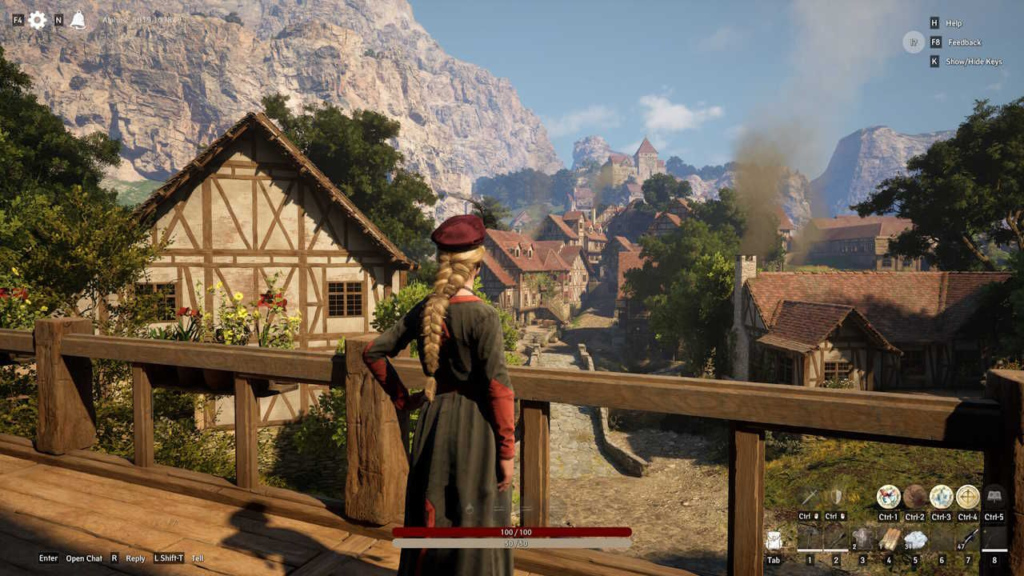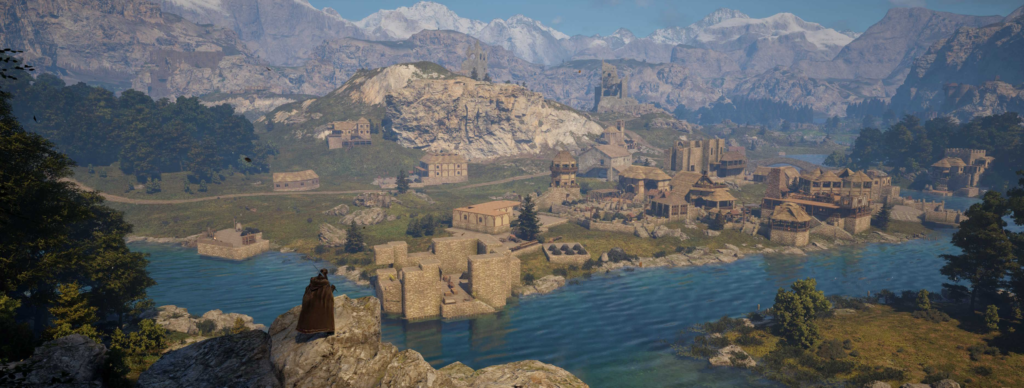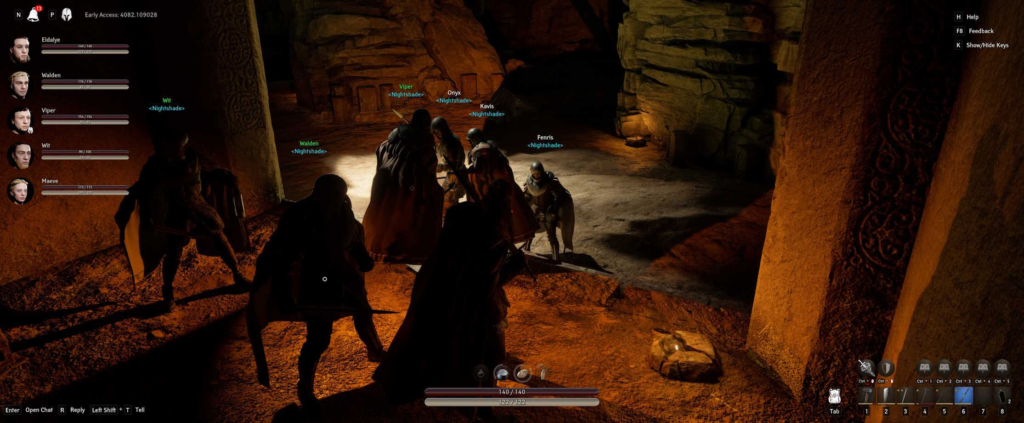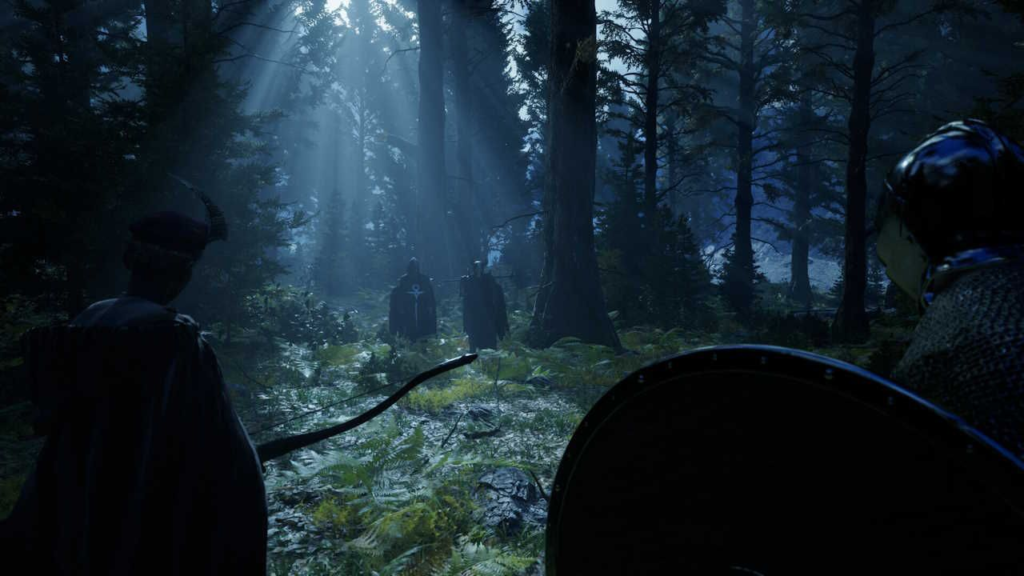
One of the first nights where Pax Dei really clicked with me was a few days after its early access debut last month, when I spent four or five hours hunting monsters with guild members. We had approximately ten or twelve people on a Discord call as we journeyed through caverns, up the slopes to storm-ruined turrets, and more, all in the search of loot, letting our swords ring as we clashed with wolves, archers, and others.
It was here that I realized how much I enjoyed Pax Dei. At its core, the developers are attempting to create a social sandbox MMO, and their excursion into the woods was the first manifestation of that vision. However, as with practically everything of Pax Dei, it appears that it need considerably more time to bake in the oven before being released to the public.
Pax Dei is a medieval-themed social sandbox MMO that incorporates components from both traditional MMOs, such as EVE Online, and newer game genres, such as building and crafting elements found in survival games. The MMO’s developers at Mainframe Industries are quite clear that this is not a “feature complete” game, but rather one that has a long way to go before it is ready for its 1.0 release.
When it comes to Pax Dei’s meat and potatoes, there’s a lot to offer. The fundamentals of Pax Dei are present, beginning with its building features, which will allow players to construct towns, cities, and eventually kingdoms that will, in theory, rule the MMO. Crafting is also featured, with vocations like as leatherworking, armorsmithing, and others available right now.
Good bones
At first glance, Pax Dei appears to have solid foundations. The planet is stunning, and it clearly shows off its Unreal Engine 5 roots. Light streams realistically through forest rooftops, but dungeons and caves are sufficiently dark to require the use of torches while spelunking.
While the environment first appeared to be conventional Medieval fantasy, once I left my stronghold, it became actually exciting to explore. Exploring the collapsed towers and witnessing the enemies guarding the wealth within made me wonder what caused them to collapse. Who were these guys, and what were they still guarding?
There isn’t much lore in Pax Dei yet, but the planet appears to be ready for it to be introduced gradually into the MMO. What will future adversaries drop, and what treasures await explorers in the dungeons?

Will we witness manifestations of the world’s magic beyond the spells that we and some of the enemy can cast? I’m forward to see how the Mainframe team expands on this, especially as new biomes open up.
There is now only one biome available, which is based on real-world France and includes woodlands, steep terrain, quarries, and other areas to explore. It can become monotonous after a time, albeit the theme varies slightly between locations around the world.
My region, Gael, has more trees over much of the eastern marches, but the Shire south of us appears to have more rugged, desolate terrain to explore (though it doesn’t lack the Shire-like elements). Caves and destroyed towers dot the terrain, and I even came across what appeared to be a bleak, devastated woodland that reminded me of the Barrow Downs from The Lord of the Rings.
Complex for the sake of complexity.
There are resources to be obtained throughout each of these places, from Gnesis stone for foundations to Iron Ore to power industry foundries. A big portion of the gameplay right now is just acquiring these materials to use, whether through your own crafting talent or by rallying the strength of your Clan, Pax Dei’s version of guilds.
There’s enough to do here as well. To say the least, crafting is complicated. Many crafting recipes call for a large number of small components made from raw materials, such as the timber beams, planks, and plugs used to construct walls or floor foundations, as well as the iron nails and hinges used to make chests. Some armorsmithing recipes call for iron studs to be riveted into the armor plate, which necessitates a large supply of resources.
As a result, it can be intimidating at first, especially when you start to calculate how many iron ingots you’ll need to effectively manufacture that greatsword or how many boars you’ll need to skin and tan the hides of to achieve that complete set of leather armor.
This crafting loop is currently the fundamental gameplay of Pax Dei, thus making sure it respects the player’s time while both being balanced and taking time to learn is critical. Right now, while the loop’s foundation is excellent, I still feel that things are way too confusing, or that some of the more advanced techniques use far too many ingredients to create an item.

Consider the Steel Greatsword, a weaponsmithing item that consumes enough charcoal to burn down a forest. Over 9000 pieces of charcoal are required to smelt down the ore needed to construct the weapon. This means you’ll need at least 17K pieces of wood. While it’s not difficult to cut down trees, the process can become mind-numbing after around three trees.
You also risk failing at your crafting job, wasting both materials and time. While you can recover some of the lost objects, you cannot recover all of the materials you worked so hard to obtain. To be fair to Pax Dei’s system, it does indicate the difficulty your character will face if you attempt to craft something beyond your current skill level – though it should be noted that crafting beyond your current skill level is the only real way to gain crafting experience quickly enough to progress at a reasonable rate.
As a result, much of my early time in Pax Dei was spent hacking at trees and rocks, gathering what little clay I could find (really, this is the resource that has escaped me the most, and it’s annoying at times), and traveling more and farther afield to find them. I’d bring them back to my hovel and work out a few crafting levels before speeding back out into the world to get more.
This gameplay loop, on the one hand, has been calming to me for years when I did it in survival MMOs like ARK: Survival Ascended, No Man’s Sky, and Conan Exiles, though it should be noted that in those games, I felt progression much, much faster, with less convoluted recipes to get to where I wanted to before I logged off for the night.
Some of Pax Dei’s crafting benches are passive craftsmen, which means they craft your item without your presence and use real-world time in the process. Crafting the vast quantity of charcoal required to make a steel sword can be done overnight, assuming you have enough Kilns loaded with wood to perform the job, as can smelting the ingots required to labor on the anvil the next day.
I really appreciate this combination of passive and active crafting because it allows me to achieve a lot of things at once if I plan beforehand. Being able to position oneself for success the next time I check in is a big reason I enjoy industry games like EVE Online. Spending a session blasting space rocks for minerals and then building ships in station while I cook supper for my family gives me a sense of accomplishment, and Pax Dei provides the similar experience.
Right now, however, the amount of work required to construct relatively basic products versus the time spent does not feel proportional, especially if you’re in a small group. According to the developer, Pax Dei is not a solo game, and this loop is the most noticeable. These hefty requirements are alleviated by cooperating with other players, whether in an impromptu group or your clan.
Inherently social.
At the beginning of my early access review, I said that Pax Dei really clicked for me when I was playing with about 10 or 12 clan members. Since the first day I entered into Pax Dei, I’ve been a member of Nightshade, one of our Gael server’s largest, if not the largest, clans.
Pax Dei intends to be a social sandbox that highlights the “multiplayer” aspect of MMORPGs. Pax Dei simply works better with other people. Whether it’s organizing a big collecting group to scour the field for that hard-to-find clay or hunting down foes to acquire the lockets needed for some higher-tier crafting recipes, everything in Pax Dei feels centered on the basic premise of doing things with others.
When you have 20-something players all gathering wood to fire up the kilns or when you have hunting parties bringing back plenty of corpses to help your cooks level their charcuterie skills, the onerous crafting needs seem less daunting.
It begs the question, though: am I enjoying Pax Dei or just the human interaction? I’d say both, which is fine and aligns with the developer’s ambition to transform Pax Dei into the MMO they envision it becoming in the future.

Crafting gets less tedious when you’re having a good discussion, exploring wilderness PvP zones becomes less perilous when you’re not alone, and even deforestation activities become easier when you have a group of people working on it.
However, due to the current lack of content in Pax Dei, I found myself in a bit of a social no-man’s land when it came to choosing a job within my group. We had so many individuals wanting to level crafting talents like weaponsmithing and armorsmithing that even with everyone pooling resources, there were only so many to go around.
As a result, I felt relegated to the role of a simple gatherer, which was not what I had envisioned for myself early on, and certainly not how I intended to play in a sandbox MMO where I could choose my own future. This isn’t my clan’s fault; there just isn’t enough additional stuff to support more playstyles right now. As a result, I can see folks becoming easily burned out, both with their playgroup and with the MMO in its current state.
For the purposes of this review, I tried to do a little bit of everything, using resources I gathered myself rather than taking from our clan stash, though I will admit that I would not have gotten nearly as far as I did if it hadn’t been for the gear and tools our weaponsmiths and armorsmiths made for me.
Seriously, it is impossible to emphasize how much easier gathering is when you have high-quality tools to chop at an iron deposit or a fantastic tree. And this was only achievable early on because our clan’s objective was to fast advance a few artisans to higher ranks.
What this did entail, however, was that we had a large number of goods that were simply sitting in chests. One feature that Pax Dei should implement as soon as possible is a recycle mechanic to recover part of the materials used to create no longer needed products. We have so many wrought iron pickaxes, chainmail, and other items that we literally set up a row of chests with a large wooden arrow pointing to them to give away to anybody that went by our hamlet because they were taking up too much space.
Launch issues raise their heads.
What’s an MMO launch, whether early access or not, without some launch issues? Over the years, I’ve modified my stance on whether or not issues are acceptable – games are difficult to create, and even more difficult to implement live services at scale. However, even after a few weeks of early access, we’re still working with several major flaws that might make spending time in Pax Dei feel like a waste for some.
Initially, one major difficulty was that the server could not keep up with the build queue, and items would take literally hours to spawn in after you put them. This ground progress came to a halt, making it difficult to play, as even acquiring stuff and attempting to store them in a chest resulted in the same progression issue.
One of the major flaws that appears to be circulating (and which the developers have recognized this week) is reports of construction parts and crafting stations simply disappearing into thin air. I noticed this myself last week, when portions of my house’s foundation, some of its walls, and even my personal furnace vanished without a trace.

In a game where gathering materials takes a long time, especially when many of these recipes require a large number of resources, having that time feel wasted is not something I want as a player.
Bugs are expected, of course. After all, this is early access, and everything I’m currently working on will be lost with an eventual wipe. But right now, while I try to play, they may certainly make it difficult, knowing that a portion of the building I created last night may be gone.
Hopefully, these will be resolved quickly, and future bugs will be reduced as Mainframe’s server uptime increases. This is, of course, the purpose of early access, so I’m hoping that when the actual launch occurs, these types of progression-halting errors will not resurface.
Fighting Combat
I’ve suggested venturing farther afield to combat opponents, such as wolves, archers, knights, and so on. Combat is undoubtedly Pax Dei’s weakest element, owing to the lack of genuine hit detection on foes and your own avatar.
Swinging a greatsword in a wide arc now feels weightless, and foes do not respond correctly when hit. As a result, blocking feels imprecise; the only way I could tell I was successfully blocking something was the reduction in the floating damage figures that sprang from the ether after a strike fell.
However, there is something to like here. I enjoy how, despite the floaty nature of fighting, weapons feel different. Bashing an enemy with a mace feels very different from skewering a boar with a spear. The greatsword, which has been my weapon of preference, sweeps enemies in front of me, dealing AOE damage in comparison, particularly when using the sword twirl skill that the weapon grants when equipped.
Indeed, each weapon (save the bow, from what I can gather) comes with a particular ability that deals more damage and has additional benefits, and this is how you may help establish roles within a group when hunting. Equipping your heavily armored players with a Mace and Shield grants them a shield bas talent that stuns adversaries and crushes skulls, whilst spears can utilize Thrust, which propels the spear lunging forward, skewering many enemies in its route.

Grouping is now rather painless, though reviving a fallen ally might be more difficult. Having to position yourself above the corpse in the exact perfect area and engage with them only to have that player go into a notifications menu to access the revival is a little, to use the word of this review, complex. There should be a popup the moment you place your aiming reticle on the body, and it should appear in the center of the screen of the person being revived so that it is not overlooked. However, these types of UI flaws can be resolved with feedback and patience.
Again, the bones of something good are present, and the devs have publicly recognized that this component of Pax Dei requires significant development. PvP feels just as airy, and it’s one feature I haven’t really investigated because players tend to avoid one other while in danger zones. When I wanted to fight, I would envision myself as unnumbered, therefore I would be the one who avoided the fight, especially because you lose everything when you die. You can resurrect your corpse when you’re close enough after reviving at a nearby stone, but by then, the other players will have taken all they could fit in their pockets.
So, where are we going from here?
As previously stated, Pax Dei has good bones. I believe the basis is very sturdy. Even now, there is a lot to offer, especially if you enjoy constructing and creating loops. But, unfortunately, after about two weeks, I feel like I’ve exhausted much of what more there is to do, especially now that wipes are on the way. How much time do you devote to something knowing it will be gone in a couple of weeks or months?
So much of Pax Dei is currently being marketed on the promise of what it will be, rather than what it is now. The developers swiftly remind users everywhere, whether it’s on the Steam store page, the official Discord channel, or even when you log into the MMO, that it’s a massive work in progress.
This characteristic makes it difficult to pronounce judgment on Pax Dei, especially since it could be very different in only a few months’ time. Pax Dei, on the other hand, is charging users for the opportunity to help test the MMO during this early access period, which is expected to extend until at least June 2025.
With Founder’s packs ranging from $40 to $99, the main distinctions are cosmetic recipes and, more importantly, the quantity of land plots your account may claim. It demands a decision.
Indeed, there is significant ambiguity surrounding its monetization plan when it ultimately launches, particularly in terms of how you might acquire new plots. Because you may now buy more plots with real money in the form of more expensive Founder’s packs, there is concern that this will continue to be a trend when the full 1.0 game is released.
The fact that Pax Dei has been clear about the fact that there will be a subscription cost associated with the MMO is also cause for concern, not because paying a sub is a relic of past MMOs, but because there is a dearth of meaningful information about what this sub covers. Is it only game access, or will you lose your plot and all of your progress if you must leave the globe for an extended period of time for any reason? Do you have to pay additional sub fees if you own many plots? How much will it cost? Can this fee be compensated by an in-game item that can be purchased with gold, similar to PLEX in EVE Online? There are more questions than concrete answers right now.

How can Pax Dei keep its players in the social sandbox it is creating? Arguably, Pax Dei requires a large player base to keep things interesting. Indeed, only a few weeks after debut, my guild has gone on to other games, and our Discord voice chat is basically dead after two weeks of almost constant activity. chunk of this is due to the fact that there isn’t much to do other from crafting and constructing, but what are the hooks in the next significant chunk of this early access phase that will keep them interested the next time?
$40 isn’t cheap, let alone $99, and you’re practically paying for an alpha here. Early access has become the primary method of game release in recent years, and Mainframe has said that the profits from early access sales will be used directly to fund the MMO’s development. Could one claim that Pax Dei jumped into early access too soon? Sure, the studio’s logic makes sense: they need gamers to help shape the MMO’s future.
For my part, despite the crafting balance difficulties (and my ability to properly roof my house), I’ve had a great time in Pax Dei. Despite being burned out on survival games lately (I can only build so many virtual houses, devs), I’ve found myself checking onto Pax Dei to tour the countryside, see what everyone else is building, track the progress of our riverfront fort, and try to fix my blasted roof. I’m grateful for the friendships I’ve met through this game, and I can’t wait to explore more of Pax Dei with them as updates and wipes occur.
The magic of Pax Dei, however, currently lies in its social fabric, and while the developers are open about the idea of this being a player-driven, social sandbox MMO, there simply isn’t enough in-game to facilitate that fully just yet, unless you’re lucky and find a good group right away, as I did.
The Pax Dei community is currently the glue that holds the game together, and this appears to be the goal even when it releases. The question I have moving ahead is whether there will be enough players returning during the early access period to support it until its 1.0 launch, or if it will fail to garner the traction it may require before reaching that stage. Time will tell, and I believe the players will be present, but with so many games coming out these days, it’s difficult to predict what will distract our attention next.
That being said, despite the enjoyment I’m having, I’m not sure I would have paid for this access if I hadn’t been given a review copy. This is the type of MMO I’m looking forward to – or at least the potential of – and I hope it succeeds. The developers are quite communicative and appear to be well aware that achieving their vision would be a difficult task. So, while I may not have paid the entry cost right now, it doesn’t mean I won’t in a few wipes – there is something here that I believe is worth paying for, even if it’s an early access product.
There is a fairly detailed plan for what is coming down the pipeline, and I’ll be interesting in returning to this review and possibly upgrading it as we progress. I’d like to see more precise timetables, but that will most likely happen once the devs have resolved the problems and glitches that have plagued the MMO since its inception.
It should be noted that, despite the difficulties, I am having fun. In fact, some of the most enjoyable experiences I’ve had in recent MMOs. There is something that attracts me back into Pax Dei practically every day, whether it’s endlessly gathering clay (really, who uses it all?) or checking to see if my clanmates are online and ready to journey into the PvP zones for those higher-tiered supplies. There is fun to be had here.
As things stand today, it’s difficult to review based on a promise – and that’s not how it should be done anyhow. $40 is a lot of money to spend on what is essentially an alpha test right now, but if everything goes as planned, it might be the start of one of the most exciting MMOs to come out in recent years. Pax Dei is currently selling a promise, and it is up to you to determine whether it is worth your hard-earned money. Because I believe the bones are good enough to warrant a closer look when you’re ready.
Review Overview
Gameplay: 78%
Story: 74%
Aesthetics: 80%
Content: 72%
Accessibility: 76%
Value: 75%
Overall Rating: 76%
Good
Summary: Pax Dei in Early Access shows promise with its unique blend of traditional MMORPG elements and new mechanics. The gameplay is enjoyable but still feels rough around the edges, needing more polish to reach its full potential. The story offers a solid foundation but lacks depth in its current state, leaving room for further development. Visually, the game has a pleasing aesthetic with well-crafted environments, although some areas could benefit from more detail. Content-wise, the game provides a decent amount of activities, but the variety is limited at this stage. Accessibility is fair, with a gentle learning curve, though some aspects of the game might confuse newcomers. Overall, Pax Dei is a good start, but it needs more refinement and content to truly shine.

